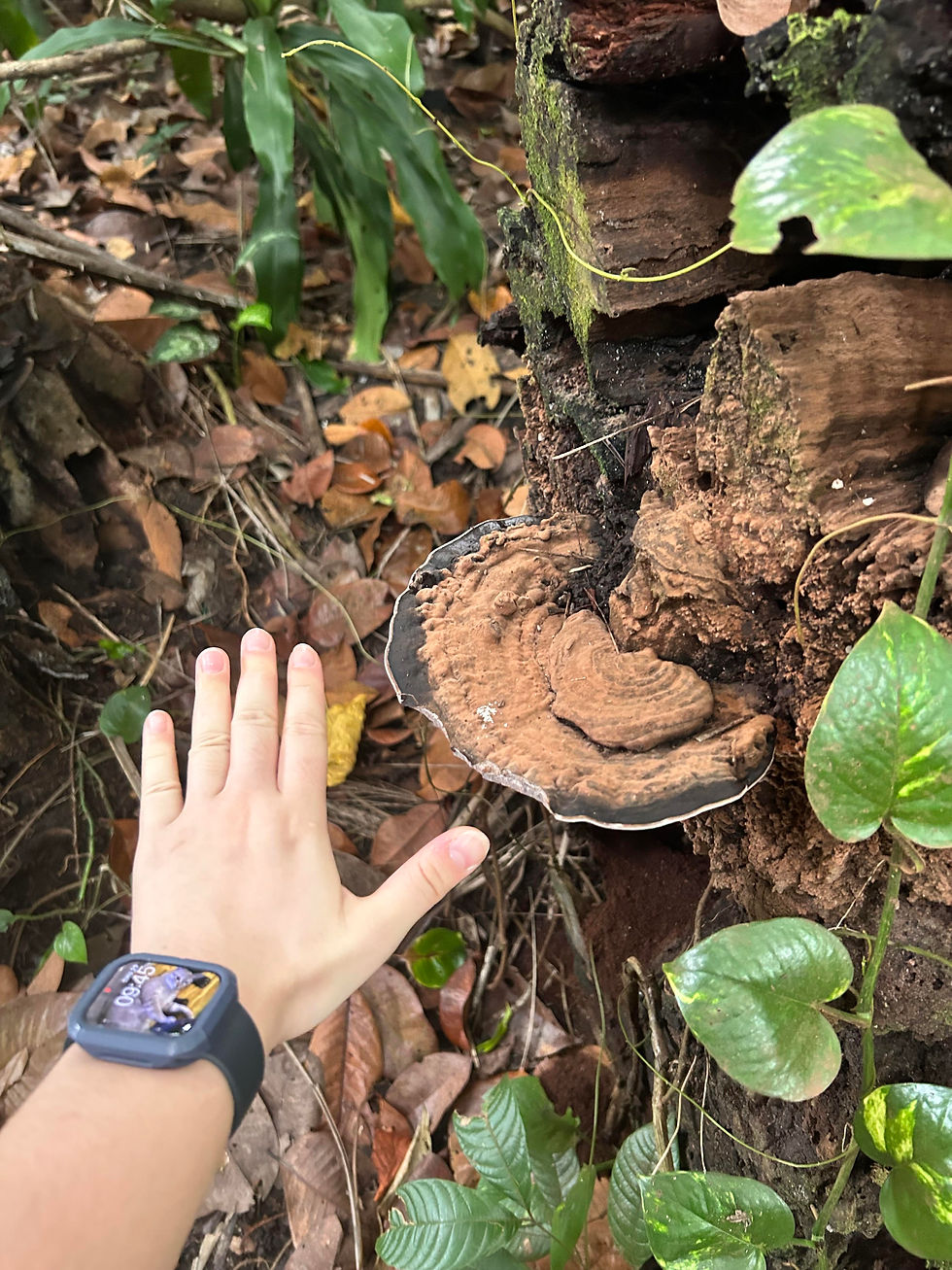Smell the Roses, Save the Planet
- Daphne Condecido

- Sep 8, 2025
- 4 min read
Updated: Dec 10, 2025
In a world where everybody is busy chasing promotions and material wealth, one of the most impactful actions you can do for the environment is to stop and smell the roses.
The COVID-19 pandemic 5 years ago made us realise one extremely overlooked and often ignored reality – we have a huge impact on nature. When humans stopped moving, nature thrived. Neatly-trimmed grass patches in Singapore revealed their wild sides, and peak hour was when the birds hunted noisily from the sky. However, when humans triumphed over the virus, nature took the backseat once again, and everything went back to “normal.”
In the years since, we have grown to be a society that is more aware of the effects of climate change around the world. However, I find that this is not enough to fight it. A big issue we face now is not that we are unaware of climate change. It is that we no longer have a connection with the environment.
Since urbanisation took over the world, our connection to nature has declined by more than 60% (Richardson, 2025). Feeling less connected with nature can mean that we do not have an emotional bond with it, and may not relate to and want to act on problems that harm it. That is the last thing we need in this already suffering climate. With more cities, fewer green spaces, and more jobs that take us out of said spaces and file us in office cubicles, 60% is not a shocking statistic.
When was the last time you actively listened to the birds calling outside your window? How many native plants can you recognise in your neighbourhood?

The never-ending rat race even blinds us to the green spaces that already exist. I live in Singapore, a tiny red dot on the global map that is better known for its malls than its landscape. However, we have built and cultivated 350 parks and green spaces, with an extensive Park Connector network to make these spaces more accessible to all residents.
Hiking in Singapore was not a popular activity until the pandemic struck and forced us to satiate our wanderlust with a walking trail at the nearest nature reserve. Because of this boom (Wong, 2020), hiking interest groups doubled in size overnight! It took the world grinding to a halt to realise that we have the capacity to appreciate what we have in front of our own eyes.
So how do we keep connecting with the earth and, more importantly, nurture this relationship between humans and nature? I say we stop and smell the roses. Occasionally removing yourself from the flurry of urban life and moving or living with intention will allow you to observe the physical world around you, forming an emotional bond with it through feelings of awe, admiration or curiosity. Being conscious of our actions and subsequently the impacts of them will help us become better residents on this planet, as awareness empowers us to make better choices and take accountability for the role we play in this climate crisis. The emotional connection will hopefully then spur us to take action and fight for systemic change within our communities.
This shift in perspective has benefits that can also spill over to other aspects of life. Patience and mindfulness can help you become a better citizen, too, by fostering empathy and care for others. Not to mention the many health benefits that exposure to nature gives to humans, mentally and physically. Jimenez et al (2025) found that being exposed to nature improves brain function, mood, sleep and even blood pressure. The anxiety that stems from feelings of distress and worry about the climate crisis can also be eased just by being in a green space. Being in a natural space for just half an hour drops your cortisol levels, a stress hormone (Hunter et al., 2019). Being around nature not only helps you understand and relate to it to make you a better eco-warrior; it makes you feel better, too.

The bottom line is: Slow down and incorporate more nature into your life. No matter how you do it, just go outside for a bit. Instead of taking a bus, cycle an extra 10 minutes through the park. Instead of scrolling through Instagram, do some birdwatching from your window. In between meetings, tend to your desk plant. It will look different to everybody, but what matters is that you start and you keep trying. Let’s get to know Mother Nature again, and I promise that we will all be better for it.
Sources:
Richardson, M. (2025). Modelling Nature Connectedness Within Environmental Systems: Human-Nature Relationships from 1800 to 2020 and Beyond. Earth, 6(3), 82. https://doi.org/10.3390/earth6030082
Wong, P. T. (2020, November 1). Hiking boom in Singapore as more turn to their backyard to cope with Covid‑19 travel restrictions. TODAY. https://www.todayonline.com/singapore/hiking-boom-singapore-more-turn-their-backyard-cope-covid-19-travel-restrictions
Jimenez, M. P., DeVille, N. V., Elliott, E. G., Schiff, J. E., Wilt, G. E., Hart, J. E., & James, P. (2021). Associations between Nature Exposure and Health: A Review of the Evidence. International journal of environmental research and public health, 18(9), 4790. https://doi.org/10.3390/ijerph18094790
Hunter, M. R., Gillespie, B. W., & Chen, S. Y.-P. (2019). Urban nature experiences reduce stress in the context of daily life based on salivary biomarkers. Frontiers in Psychology, 10, 722. https://doi.org/10.3389/fpsyg.2019.00722
Daphne Condecido is an Environmental Programmes Coordinator for the Waterways Watch Society in Singapore. She is an environmental educator and participant in the OneGreenThing Climate & Democracy Leadership Intensive during summer 2025.




Comments